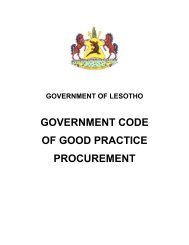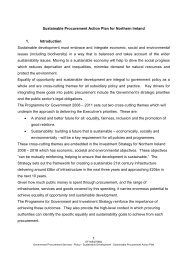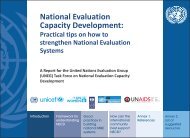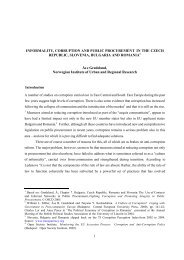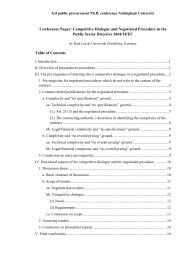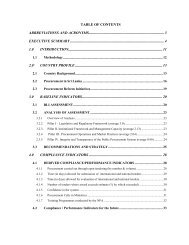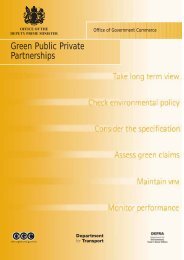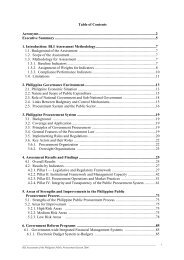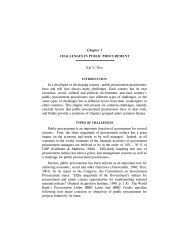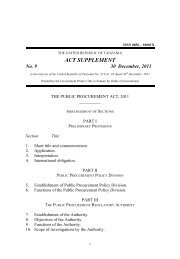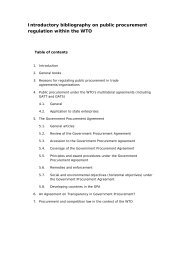The Public Procurement Rules 2008 - LGED
The Public Procurement Rules 2008 - LGED
The Public Procurement Rules 2008 - LGED
Create successful ePaper yourself
Turn your PDF publications into a flip-book with our unique Google optimized e-Paper software.
up the average prices offered by other responsive Tenderers for the missing items to the lot value<br />
to establish the winning lot Tender.<br />
(19) If the winning lot Tender under Sub-Rule (18) is missing some items, comprising less<br />
than twenty percent (20%), the Procuring Entity may procure the missing items form the Tenderer<br />
offering the lowest price for the remaining items.<br />
(20) For Works Tenders invited on lot-by-lot basis, the TEC shall award the lots<br />
considering the least cost combination of the lots.<br />
Explanation:<br />
If one Tenderer has won two (2) or more lots and was post-qualified only for one (1) lot,<br />
then he shall be awarded the lot that would result in the least cost of the total value of<br />
contracts and not necessarily the larger lot as he may wish.<br />
(21) For the purpose of evaluation of Tenders involving domestic preference under Rule<br />
83(2), the procedure shall be as follows:<br />
(a) the price quoted for Goods in Tenders from Group A shall be ex-works with or<br />
without transportation and shall include all duties and taxes paid or payable on<br />
the basic materials or components purchased in the domestic market or<br />
imported, but exclude the sales and similar taxes on the finished product;<br />
(b) the price quoted for Goods in Tenders of Group B shall be on CIP or CIF, as<br />
specified in the Tender Document, which is exclusive of customs duties and<br />
other import duties already paid or to be paid;<br />
(c) the lowest evaluated Tender price from each group shall be compared;<br />
(d) if a Tender from Group A is the lowest, that Tender shall be recommended for<br />
award;<br />
(e) if a Tender from Group B has the lowest evaluated Tender price, then it shall be<br />
further compared with the lowest evaluated Tender price in Group A and before<br />
the final comparison is made, the lowest evaluated Tender price in Group B<br />
shall be increased by the percentage for ‘domestic preference’ specified in<br />
Schedule II excluding VAT; and<br />
(f) the lowest evaluated Tender price in Group A shall then be compared with the<br />
lowest evaluated Tender price in Group B and the lowest Tenderer shall be<br />
recommended for award.<br />
(22) <strong>The</strong> successful Tenderer shall be the Tenderer who submitted a responsive Tender<br />
with the lowest evaluated Tender cost, calculated upon the basis of factors affecting the economic<br />
value of the Tender which have been specified in the Tender Document and to the extent<br />
practicable, these factors shall be objective and quantifiable and shall be given a relative weighting<br />
in the evaluation method or be expressed in monetary terms, wherever practicable.<br />
Example<br />
One of the factors affecting economic value may be the delivery schedule for Goods<br />
or completion schedule for Works. If the delivery or completion schedule for Goods or<br />
Works specified in the Tender Documents is between fifteen (15) and eighteen (18)<br />
months, and a Tenderer bases his or her Tender price on a delivery of twenty (20)<br />
months, then that Tender price may be adjusted for evaluation purpose only, if it is so<br />
specified in the Tender Document, by adding a certain percentage or a lump sum<br />
amount to the Tender price , whereby the percentage or amount for liquidated<br />
damages may be considered as a guidance, for the two (2) month delay beyond<br />
eighteen (18) months. Other factors affecting the true economic value of the Tender<br />
price may be life span costs, such as cost of spare parts, fuel, performance or<br />
productivity of the equipment, etc.<br />
83



